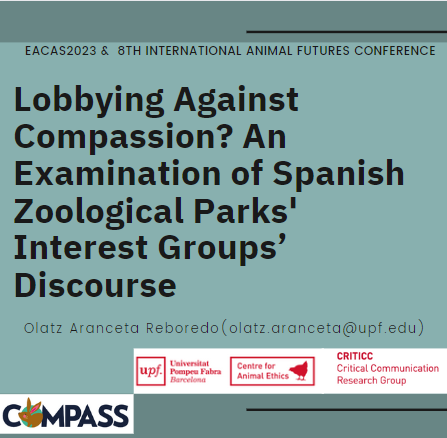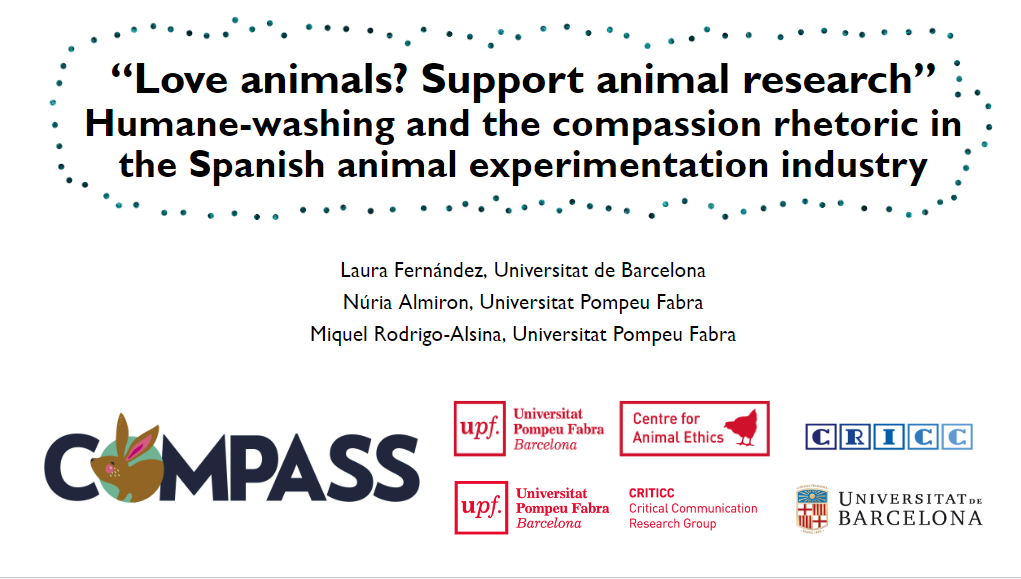EACAS & Animal Futures Conference June 2023
Presentations at the 8th Biennial Conference of the European Association for Critical Animal Studies (EACAS) & 8th International animal futures conference
Laura Fernández and Olatz Aranceta Reboredo, members of the COMPASS research team, presented the results of the ongoing project at the 8th EACAS and 8th International Animal Futures Conference, which took place 16-18 June 2023.

Olatz Aranceta Reboredo presented “Lobbying Against Compassion? An Examination of Spanish Zoological Parks' Interest Groups’ Discourse”:
Recent critical research on interest groups (IGs) related to industries exploiting animals has shown that vested interests shape discourses, manipulate knowledge, manufacture consent, contribute to inaction and enact a lobbying practice labelled as “lobbying against compassion”. This study explores the communicative practices of Spanish IGs in the animal-based entertainment industry, including zoos, aquariums, and theme parks: AIZA (Iberian Association of Zoos and Aquariums), AICAS (Iberian Association of Wild Animal Keepers), Federación Fauna, Fundación Parques Reunidos and Loro Parque Fundación. Critical Discourse Analysis was conducted on the samples, together with a template that distinguished between three discourse levels: the representation and actions ascribed to the exploited nonhumans, the exploiting industries, and the consumers. The study focuses on the ethical implications of IGs' persuasive messages and how they affect the public's compassionate responses toward nonhumans. The results indicate that the IGs instrumentalize public compassion to continue business as usual, despite the harms the industry produces to nonhuman animals. The study highlights the common strategies of the IGs, which include presenting themselves as protectors of nonhumans and their well-being, and the industries' workers as highly professional, knowledgeable, and scientifically backed. The IGs also present nonhumans as part of a genetic Noah's Ark for a better future, where ecological interests of species protection are prioritized over the interests of captive individuals. While nonhumans are portrayed as benefiting from the institutions' “care” and “animal welfare”, they are also presented as tools for education and entertainment, catering to human-centered interests. The study contributes to the critical animal studies literature by highlighting the need for ethical communicative practices that incorporate compassion and avoid condoning animal suffering. It also addresses the importance of deconstructing rhetoric like the appeal to common sense and traditions to expose the vested interests behind the discourse of the animal-based entertainment industry.
Laura Fernández presented “‘Love animals? Support animal research’ Humane-washing and the compassion rhetoric in the Spanish animal experimentation industry”, a research in co-authorship with Núria Almiron and Miquel Rodrigo-Alsina:
Animal experimentation is a practice that implies inflicting various psychological and physical harms, including death, on nonhuman animals in laboratories. Because of the increasing social concern and compassionate response by society towards nonhuman animal suffering, the experimentation community has joined the compassion and care narrative towards nonhuman animals.
We examined how the animal experimentation industry negotiates compassion through strategic communication in public relations. To this end, we have studied the discourse of the largest Spanish lobby defending animal experimentation in Spain: SECAL (the Spanish Society for the Laboratory Animal Science). Our main goal was to examine how SECAL’s narrative negotiates compassion – that is, to what extent the lobby’s messages regarding animal suffering in laboratories are authentic (it honestly addresses the suffering of the animals involved in experiments) or manufactured (it is not encouraging compassion truly or if it is even doing the opposite, blocking the natural compassion that emerges amongst the public).
Inspired by the perspectives of critical animal studies, critical public relations, and critical discourse analysis, our research studied a sample of 82 texts from SECAL’s website (www.secal.es). We differentiated three levels of discourse representing nonhuman animals used in laboratories, the animal experimentation industry and society as a beneficiary of the experimentation.
Results show that SECAL is not negotiating compassion with authenticity but rather using humane-washing tactics by framing itself as concerned about animal suffering while at the same time discouraging the cultivation of compassion amongst the public. The rhetoric of this interest group includes the use of non-inclusive and sexist language, the reproduction of the inaccurate human/animal binary that presents humans as superior, and the commodification of animals as mere capitalist resources. Our research reflects that the industry strategically relies on the compassion rhetoric, thereby blurring the contradiction of the inherent harm they routinely cause to nonhuman animals.

